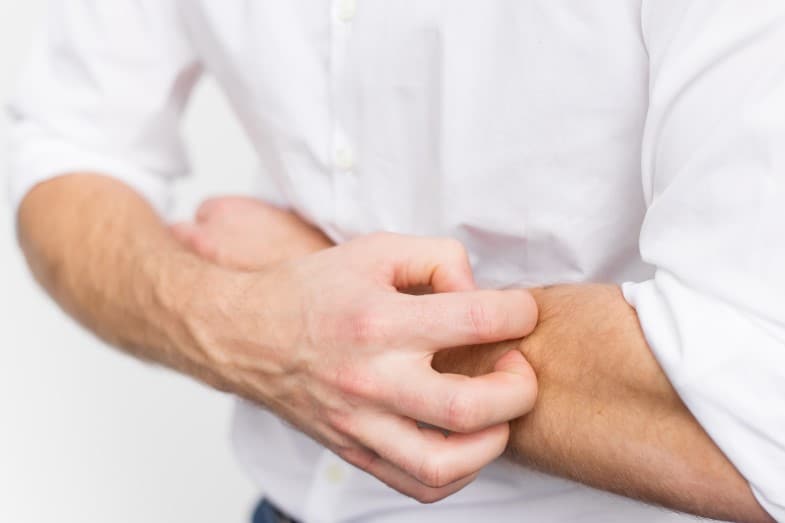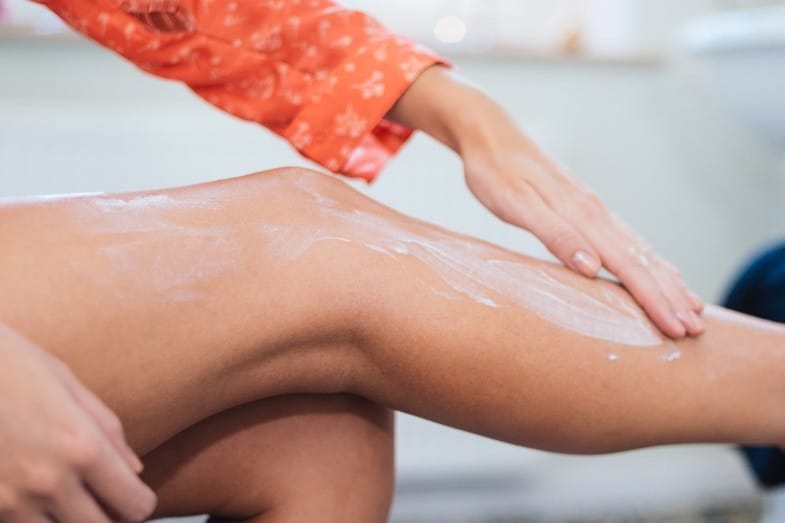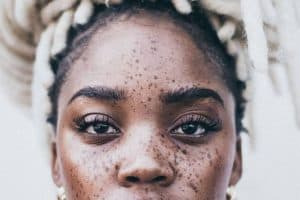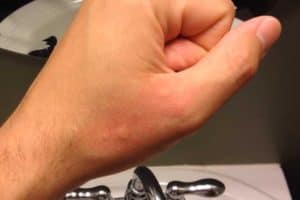Have you experienced the feeling of bugs crawling on your skin, but nothing is there? I have been asked this question several times before, and I see in forums I follow that many experience this feeling as well. So I decided to write an article on this skin issue.
This sensation of bugs crawling on your skin, even though nothing is there, is called formication. Formication is a symptom of an underlying disease or skin condition that you may not be aware of.
When you experience the feeling of bugs crawling on your skin, but nothing is there, a specific cause may be responsible for it. The feeling of crawling bugs underneath your skin is considered a tactile hallucination because there are no physical causes to it.
The truth is that there are no bugs underneath your skin. It can actually be a symptom of an underlying condition, which includes Parkinson’s disease, alcohol-drug withdrawal, Morgellons disease, and fibromyalgia, among other medical conditions.
Aside from the causes mentioned above, other pathological and non-pathological conditions can also cause the feeling of bugs crawling on you, but nothing is there. These potential causes include:
- Diabetic neuropathy
- Lyme disease
- Anxiety
- Cutaneous cell carcinoma (squamous skin cancer)
- Herpes zoster
- Environmental allergic reactions
- Morgellons disease
- Pesticide poisoning
- Menopause
- Hypocalcemia
Read on to learn more about the feeling of bugs crawling on your skin, but nothing is there, as well as the potential causes and treatments.
The Feeling of Bugs Crawling on the Skin but Nothing Is There
Formication, the feeling that bugs are crawling all over your skin, is a type of paresthesia. Paresthesia is a set of skin sensations experienced by a person due to various causes. Paresthesias are commonly associated with tingling or prickling sensations, including the feeling of “pins and needles.”
The root word of formication is formica, which is a Latin word that means ant. The feeling of “ants” crawling all over the skin can feel itchy and uncomfortable for many.
When it happens, the scratch reflex is initiated, which could continue as long as the perception is there. The continuous scratching could cause skin damage. Sometimes, formication could also be perceived as painful, burning, or tingling sensations.
In reality, there’s no physical cause of the “crawling” sensation, but a few people believe that there are real insects under their skin – no matter how the doctors or experts reassure them that it’s only in their mind.
This condition is called delusional parasitosis. An affected person may need a psychiatrist to help cure the condition.
One other documented physical cause of formication is static electricity. It can cause the movement of body hair due to the skin’s particle being attracted to it, leading to the “crawling insects” sensation, or like bugs are crawling on the skin even though there is nothing there.
Causes of Formication

There are various causes of formication. Let’s look more at the potential causes of this feeling of invisible bugs crawling on your skin.
1. Diabetic Neuropathy
This condition is a complication of diabetes mellitus, in which nerves are damaged because of high glucose levels in the blood (hyperglycemia).
The most common body parts that you can experience diabetic neuropathy are the extremities, such as the nerves of the feet and other peripheral nerve areas.
Formication, in the form of tingling, is one of the symptoms that may appear in some individuals with diabetes.
2. Lyme Disease
A tick bite causes this infectious disease. An infected tick transmits the Borrelia bacterium into your skin when it bites you. After biting your skin, redness and swelling appear. This infectious disease is also known as Lyme borreliosis, which can also cause formication.
3. Cutaneous Cell Carcinoma or Squamous Skin Cancer
This type of skin cancer causes a scaly top, which is accompanied by a hard lump and symptoms of formication. Skin lesions could also appear as scaly open sores, causing crawling, stinging, or biting sensations.
4. Herpes Zoster (Shingles)
The reactivation of the varicella-zoster virus causes herpes. It causes the formation of a self-limiting dermatomal rash on your skin. Other people may experience formication and painful blisters when they have shingles. A stinging sensation can also be experienced along with other annoying symptoms.
5. Allergic Reaction to Substances in Your Environment
Allergic reactions can sometimes be due to environmental causes, such as pollen, grass, mold, and pet dander, among others. You will have to determine the root cause of the crawling or biting sensations on your skin by eliminating each variable until you find the causative allergen.
6. Drug Withdrawal
Withdrawal from addictive, illicit, and recreational drugs can cause withdrawal symptoms, including formication. Below are some drugs that can induce formication:
- Ecstasy (MDMA or 3,4-Methylenedioxymethamphetamine): Ecstasy is an amphetamine derivative, which acts as a hallucinogen and brain stimulant. It’s often used as a recreational drug and is quite addictive. At the height of people’s hallucinations, they may believe that there are insects all over their bodies because their skin would feel icky and itchy. Sometimes, hallucinogens could even make you believe you’re Superman without a cape.
- Ritalin (Methylphenidate): Ritalin is also a stimulant used in treating conditions such as attention deficit hyperactivity disorder (ADHD) and narcolepsy (excessive sleepiness). Withdrawal from this drug can cause a “crawling insect” sensation on your skin.
- Bupropion: Bupropion treats depression and helps reduce your cravings to cigarette smoking.
- Tramadol: Withdrawal of tramadol, a painkiller, and potential antidepressant could also cause formication.
- Benzodiazepine: This medication is a tranquilizer and can also cause the same effects.
- Eszopiclone: This drug is a sedative used to treat people with insomnia.
- Cocaine: This powerful stimulant that can cause severe addiction along with formication.
- Heroin: This highly addictive and illicit drug can cause temporary euphoria and hallucinations.
Brain stimulants also have one symptom that goes together with formication, and that is formicanopia, which is the visual hallucination of insects crawling on one’s skin.
7. Alcohol or Cigarette Withdrawal
The two most abused substances in the world are cigarettes and alcohol. They are addictive, and when you stop using them, a variety of withdrawal symptoms occur.
Quitting alcohol (ethanol) can cause delirium tremens (DTs) or severe symptoms of alcohol withdrawal, including altered mental condition and formication. These symptoms are only two of the many symptoms of DTs.
8. Parkinson’s Disease
Parkinson’s disease involves a dysfunction in the nervous system that is initially characterized by tremors with progressive and worsening symptoms.
The neurons responsible for controlling movement are impaired, resulting in numerous symptoms, which include stiffness of the limbs and tremors. Those who have Parkinson’s disease may feel tingling sensations on their skin as well.
9. Morgellons
One of the major symptoms of Morgellons disease is formication. Thus, it is one primary cause of formication. This condition exhibits the presence of thread-like fibers under the skin. This sensation can give people the feeling of bugs crawling on their skin.
Other sensations could include stinging or biting. More often, severe itching occurs. Red skin sores also tend to appear out of nowhere and then slowly disappear.
Some people also complain of hair and tooth loss, cognitive problems (short-term memory loss and difficulty concentrating), muscle and joint pains, fatigue, and sleep problems.
Because this disease isn’t clearly understood, health specialists differ in their opinions on whether it is a physical condition or a type of psychosis. Also, Morgellons disease is associated with delusional parasitosis, in which people think that parasites have resided in their skin, which, of course, isn’t true.
10. Fibromyalgia
During fibromyalgia flare-ups, affected individuals can experience pain all over their body, including skin pain. Because of extreme sensitivity, they can feel biting or stinging sensations on their skin.
11. Menopause
Due to an imbalance of female hormones, menopausal women may experience formication and hot flushes, among other symptoms.
12. Pesticide Poisoning (Mercury Poisoning)
One of the symptoms of pesticide poisoning is skin irritation, which mimics formication. So, if you don’t find any other reason, you may consider this possibility, especially in children. Always keep pesticide cans away from children’s reach to avoid accidental poisoning.
13. Hypocalcemia
Low levels of calcium in your blood can also cause formication. Calcium is an essential nutrient for cell growth, especially in the bones, teeth, and other parts of the body.
Its body functions include blood clotting and coenzyme reactions, including acting as a catalyst on biochemical reactions, nerve impulse transmissions, and many more.
Treatment of Formication – Stop the Feeling of Bugs Crawling on the Skin
We’ve looked at what could be causing the feeling of bugs crawling on your skin even though nothing is there; now, let’s look at the possible treatments. Treatment would depend on the different underlying diseases or causes of formication.
To set some examples, here are some treatment methods based on the root causes of formication.
1. Antihistamines
Antihistamines, such as Benadryl, are used as a treatment for symptoms of allergies. These drugs counter the effects of allergens from the food we eat and other environmental factors.
Anti-allergy meds tend to lessen the “crawling” feeling on the skin when the allergy subsides. These medications are available in oral and topical forms, including injections.
2. Radiation Therapy
Formication due to skin cancer may require radiation therapy as treatment. When cancer goes into remission, the crawling and itching sensations would also lessen.
3. Psychiatric Evaluation and Treatment
This treatment method applies to patients with delusional parasitosis and those who believe that bugs actually live underneath their skin.
Additionally, this type of treatment is beneficial to patients who are into illicit drug withdrawal phases, as their delusional tendencies are more pronounced.
4. Hormone Replacement Therapy (HRT)
This method applies to menopausal women, particularly when they are given replacement hormones. After balancing their hormones, the crawling and stinging sensations would also disappear.
5. Hydrocortisone
Hydrocortisone is a topical cream that can be directly applied to itchy skin. This medication can help decrease annoying symptoms, including formication. It could also be used in any type of formication, as its action is to lessen the itchy feeling.
Specific Treatments for Certain Diseases
Doctors would prescribe specific medications according to the underlying disease that causes formication.
- Diabetic Neuropathy: Oral medications for diabetes, including insulin injections, are prescribed to help control blood sugar levels. These meds can help lessen the symptoms and minimize the risk of diabetes complications.
- Pesticide Poisoning: Skin and gastrointestinal decontamination can treat pesticide poisoning. However, other treatment methods are also available, depending on the type of pesticide exposure.
- Drug Withdrawal Symptoms: In the case of drug withdrawal, formication treatment would be in line with the treatment of other symptoms of the condition. Treatment includes the withdrawal of the addictive drugs or detoxification, whichever is most suitable to the patient’s health status. This treatment method should be under the close supervision of a health specialist.
Home Remedies to Stop the Feeling of Bugs Crawling on the Skin

1. Ice Pack
Applying an ice pack over the affected skin area would provide relief from the itching, pain, and crawling sensations. Don’t apply an ice pack for more than 10 seconds on each area. Make sure to transfer the ice pack all over the affected area constantly. Letting it stay longer in one area can damage your skin.
Don’t apply ice directly over your skin. The ice must be wrapped or placed in an ice bag.
2. Skin Moisturizers
You have to maintain the natural moisture of your skin by using skin moisturizers. They can help decrease the itchiness and crawling sensations on your skin.
3. Hydration
Proper hydration can help in maintaining healthy skin. Dry, scaly skin can be more prone to itchiness and the feeling of crawling bugs. Drinking more than eight glasses per day would also boost your circulation, respiration, excretion of toxins, and the proper growth and development of cells in your body.
4. Exercise
Exercise is commonly included in a person’s recovery process since it promotes the health and well-being of recuperating patients. The same goes for treating formication. When your body’s systems are functioning well, your skin would be healthy, too.
5. Correct Diet
The right diet for individuals suffering from formication is a low-fat and low-sugar diet. It means that you should eat more fruits and vegetables and eat less fatty meat, dairy products, carbohydrates, and other sugary foods.
Tips in Managing Formication
- Never scratch your skin. When itchiness occurs, pat your skin gently with your hands, or apply an ice pack.
- Don’t attempt to self-medicate; you don’t know the enemy, so there’s no way you’d know how to treat it correctly.
- Never prick or cut your skin to see what’s inside. Doctors use sterile materials when they cut through the skin. Even then, cutting your skin to find out what causes the crawling sensation is never an option.
There are numerous non-invasive modern devices available these days that could easily “see” through your skin without any incisions or cuts.
Conclusion – The Feeling of Bugs Crawling on the Skin but Nothing Is There
So to revisit our initial question: why do some people feel like bugs are crawling on their skin, even though nothing is there? The feeling of bugs crawling all over your skin is called formication. It’s a type of paresthesia that includes “pins and needles” sensations.
Underlying diseases can cause it, or it can be due to delusional parasitosis. The conditions below most likely cause formication:
- Diabetic neuropathy
- Lyme disease
- Cutaneous cell carcinoma or squamous skin cancer
- Herpes zoster (shingles)
- Allergic reaction to substances in your environment
- Drug Withdrawal
- Alcohol or cigarette withdrawal
- Parkinson’s disease
- Morgellons Disease
- Fibromyalgia
- Menopause
- Pesticide poisoning (mercury poisoning)
- Hypocalcemia
The treatment of formication often depends on the specific treatment for each disease. However, over-the-counter meds and home remedies can also help minimize the symptoms. They include:
- Topical creams (hydrocortisone)
- Antihistamines
- Ice packs
- General health management strategies
People with severe cases of psychosis often require an evaluation and treatment by psychiatrists.
If you’re having sensations of bugs crawling on your skin, but nothing is there, try to find out the root cause of this sensation and follow the home remedies mentioned above for relief.
When formication persists, consult your doctor for proper diagnosis and treatment of a possible underlying condition.
Related reading:
Skin Feels Prickly but No Rash [9 Causes and Treatments]
Feels Like Something Is Biting Me but Nothing Is There
Needle Pricking Sensation on Skin Surface



